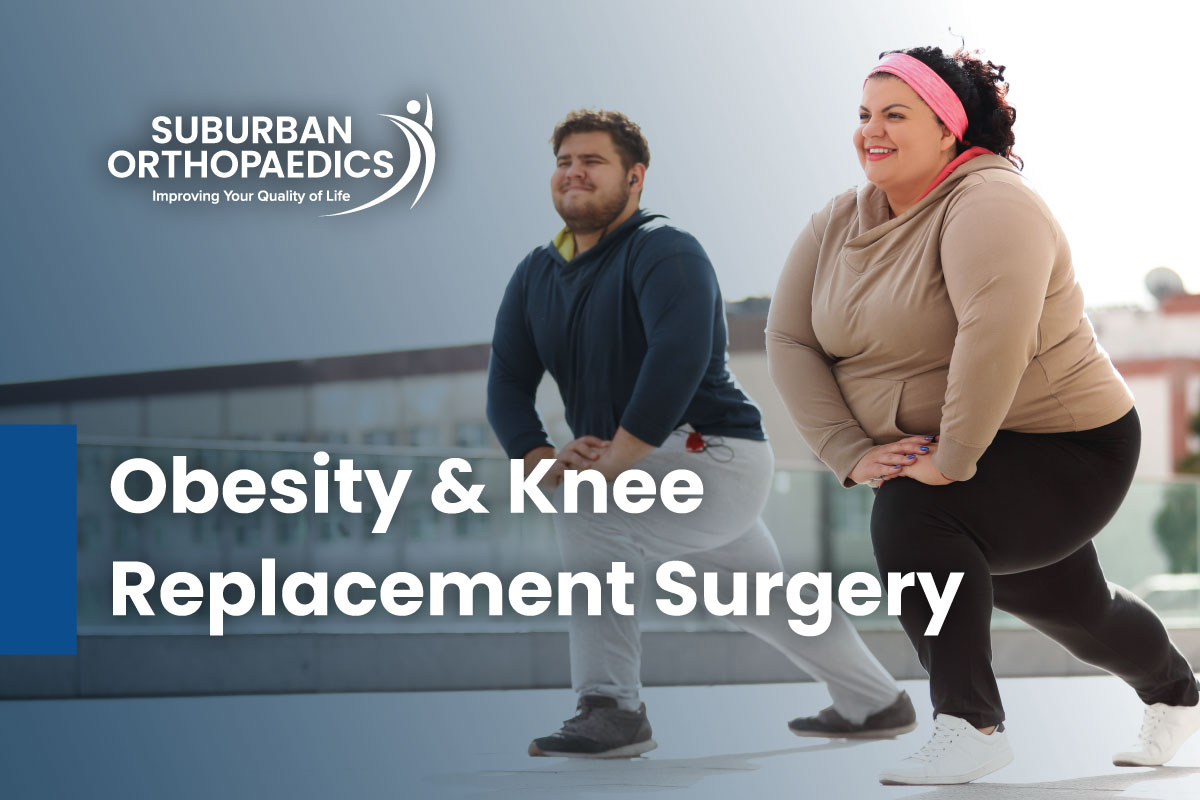Knee pain can significantly impact your quality of life, especially when osteoarthritis or other degenerative conditions limit mobility. For some patients, knee replacement surgery is the solution but obesity can play a role in both the decision-making process and recovery.
At Suburban Orthopaedics, we work with patients of all sizes to provide personalized care, ensuring the safest and most effective outcomes for knee replacement surgery. Understanding the connection between obesity and knee replacement is an important first step toward a smoother recovery.
How Obesity Affects Knee Health
Being overweight increases stress on your knee joints. Every extra pound adds pressure on the cartilage and ligaments, accelerating wear and tear. This can lead to:
- Early onset osteoarthritis
- Increased pain and stiffness
- Reduced mobility and activity levels
Obesity can also affect surgical planning and recovery. According to the National Institutes of Health (NIH), patients with obesity undergoing knee replacement may face:
- Higher risk of complications during surgery
- Increased strain on the replaced joint
- Longer recovery times and physical therapy needs
However, weight alone is not a barrier to knee replacement. Suburban Orthopaedics evaluates each patient individually, taking into account overall health, joint condition, and lifestyle factors to create a safe, personalized surgical plan.
Preparing for Knee Replacement Surgery
Preparation can improve both safety and recovery outcomes. According to the American Academy of Orthopaedic Surgeons (AAOS), preoperative conditioning and education can significantly impact surgical success. Key steps include:
- Strengthen Supporting Muscles
Strong quadriceps, hamstrings, and core muscles help support the knee and improve post-surgery recovery. - Improve Cardiovascular Health
Low-impact cardio like walking or swimming enhances endurance and can reduce surgical risks. - Weight Management
Even modest weight loss reduces stress on the knee joint and improves recovery. A dietitian or trainer can guide safe weight loss strategies. - Pre-Surgery Education
Understanding the surgical process, recovery timeline, and home modifications sets realistic expectations and helps prevent setbacks. - Physical Therapy Planning
Starting preoperative physical therapy can improve flexibility, strength, and mobility—helping you recover faster after surgery.
Recovery and Long-Term Care
Knee replacement is a major surgery, but with the right preparation and post-operative care, patients—including those with obesity—can achieve lasting pain relief and improved mobility. Recovery typically involves:
- Gradual return to activity with guided physical therapy
- Weight management and healthy lifestyle adjustments
- Monitoring and follow-ups to ensure the joint is functioning optimally
According to Mayo Clinic, following rehabilitation protocols and maintaining a healthy weight are crucial to protecting your new knee and maximizing function over the long term.
Our goal is to help every patient regain independence and confidence, no matter their body type.
Frequently Asked Questions:
Q: Can obese patients still get knee replacement surgery?
A: Yes! Obesity is not an automatic disqualifier. Surgeons assess overall health, joint condition, and readiness for surgery to determine candidacy.
Q: How does weight affect recovery?
A: Extra body weight can place additional stress on the new joint and may increase recovery time. Physical therapy and gradual activity progression are critical.
Q: Should I lose weight before knee replacement surgery?
A: Even a small amount of weight loss can reduce joint stress and improve outcomes. Our team can guide you safely before surgery.
Q: How long is recovery after knee replacement?
A: Most patients regain basic mobility within 6 weeks, with continued improvement for several months. Personalized physical therapy plans help optimize recovery.
Q: Will knee replacement surgery help me lose weight?
A: While surgery doesn’t directly cause weight loss, reduced pain and increased mobility can make physical activity easier, supporting a healthier lifestyle.
At Suburban Orthopaedics, we understand the challenges obesity can present in knee replacement surgery—but we also know how to help patients navigate them safely and effectively. Our team provides expert guidance, personalized care, and support every step of the way.

